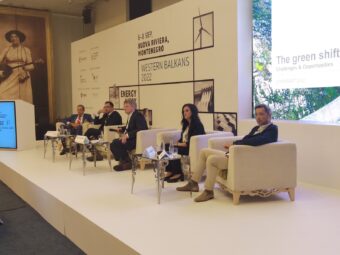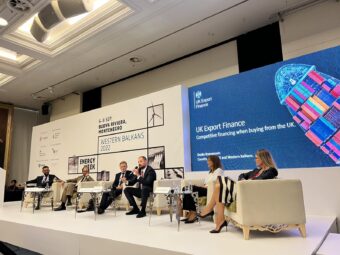
The Energy Week Western Balkans conference organized by the British company Invest In Network is underway in Montenegro.
The first panel discussed the potential of clean energy sources in the Western Balkans. The participants were Rigela Gegprifti, from the company Statkraft from Albania, Mladen Grgić, Director of the Montenegrin Investment Agency, then Francesco Corbo, representing the European Bank for Reconstruction and Development (EBRD) and Eric Scotto, President, and co-founder of Akuo Energy. The panel moderator was Artur Lorkowski, director of the Energy Community Secretariat.
The participants discussed the potential of the Western Balkans in terms of clean and renewable energy sources, what is particularly interesting for investors in the region, and the transition of the energy mix to RES. All the speakers highlighted the region’s great potential. They mentioned the most important projects that have already been implemented, as well as those that are planned.
Mladen Grgić underlined the great importance that lies in the connection between our countries because we share rivers and lakes, and most of the Western Balkans countries were one country in the past. As he pointed out, establishing cooperation beyond individual countries’ borders is very important since we all have the same goal, and investors see the region as a whole, not as separate countries.
The participants agree that what represents a challenge, despite the great interest of the private sector, is the insufficiently structured approach of the governments of our countries, as well as the absence of regulations and laws.
Francesco Corbo pointed out that the 72 MW Krnovo wind farm project, the first wind farm in Montenegro and one of the largest in the region, is the first EBRD project in our region after almost 30 years.
Eric Scotto mentioned that Montenegro, where Akuo Energy established this project, was supposed to be the first country in Europe to use 100 percent renewable energy sources.
They especially mentioned that Montenegro is a country where all households will have the opportunity to save significant funds thanks to the large capacity of renewable energy sources and the great potential for energy export. Scotto referred particularly to electricity storage, which is of great importance and one of the key elements in the energy transition.
“In the past, people resisted using renewable energy sources, but today there is no alternative; even energy prices give us a signal that it’s time to speed up,” he pointed out.
The panel participants said that everyone present certainly knows what needs to be done, and if they act, we will all create a better future for all of us and our children. They emphasize that “we need to act swiftly right now”.
Project financing
The second panel on the first day of the conference was about the financing of clean energy projects, the transition from feed-in tariffs to the auction system, and funding risks and how to minimize them. The moderator of the panel was Petar Mitrović, partner and lawyer at Karanović & Partners, while the panelists were Guido Cleri, representing the European Investment Bank (EIB), Matti Piiparinen, from the Green for Growth Fund (GGF), Duško Krsmanović representing UKEF, Milica Sredanović, Head for Infrastructure at International Financial Corporation and Maja Turković Senior Vice President SVP Development Europe.

Guido Cleri spoke about the EIB’s investments in renewable energy sources, and everyone was interested in the position of investing in projects involving the private sector and how much they are willing to risk in order to reach the targets for reducing GHG emissions by 2030.
Matti Piiparinen from GGF (Green for Growth Fund) spoke about the organization’s activities and projects within Finance in Motion that advise GGF on harnessing the power of green finance and investments that reduce CO2 emissions in 19 markets across Europe, the Middle East, and North Africa.
As he explained, they are working on six Sustainable Development Goals (SDG): Clean Water and Sanitation (SDG 6), Affordable and Clean Energy (SDG 7), Industry, Innovation and Infrastructure (SDG 9), Sustainable Cities and Communities (SDG 11), Responsible consumption and production (SDG 12) and Climate Action (SDG 13).
Duško Krsmanović is the UKEF manager in charge of the Western Balkans, Central and Eastern Europe; in his presentation, he talked about the projects they are working on and how UK Export Financing works.
Milica Sredanović emphasized the importance of IFC financing in the region and underlined that 54 per cent of their energy portfolio is in renewable energy sources.
The presentation of Maja Turković related to projects in the sector of renewable energy sources but also the challenges they face due to the current situation on the market.
The conference Energy Week Western Balkans is held on the Montenegrin coast and lasts from September 6 to 8, 2022.
Energy Portal



